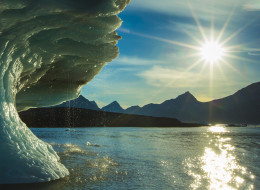State Department documents released to an environmental group are raising new questions about the hiring of a government contractor to evaluate environmental impacts of the proposed Keystone XL pipeline.
Environmental Resources Management has conflicts of interest that should have prevented it from winning the contract for the analysis of the controversial pipeline, which would carry oil from Canada's oil sands to the U.S. Gulf Coast, the Sierra Club has said. The group filed a Freedom of Information Act request with the State Department seeking documents that would show how Environmental Resources Management was chosen. Sierra Club provided some of the documents it received to The Huffington Post.
Keystone XL Contractor's Potential Conflicts Of Interest Not Mentioned In State Department Documents
Arctic Temperatures Highest in at Least 44,000 Years
 Plenty of studies have shown that the Arctic is warming and that the ice caps are melting, but how does it compare to the past, and how serious is it?
Plenty of studies have shown that the Arctic is warming and that the ice caps are melting, but how does it compare to the past, and how serious is it?
New research shows that average summer temperatures in the Canadian Arctic over the last century are the highest in the last 44,000 years, and perhaps the highest in 120,000 years.
"The key piece here is just how unprecedented the warming of Arctic Canada is," Gifford Miller, a researcher at the University of Colorado, Boulder, said in a joint statement from the school and the publisher of the journal Geophysical Researcher Letters, in which the study by Miller and his colleagues was published online this week. "This study really says the warming we are seeing is outside any kind of known natural variability, and it has to be due to increased greenhouse gases in the atmosphere."
Gulf Ecosystem in Crisis Three Years After BP Spill
 Hundreds of kilograms of oily debris on beaches, declining seafood catches, and other troubling signs point towards an ecosystem in crisis in the wake of BP's 2010 oil disaster in the Gulf of Mexico.
Hundreds of kilograms of oily debris on beaches, declining seafood catches, and other troubling signs point towards an ecosystem in crisis in the wake of BP's 2010 oil disaster in the Gulf of Mexico.
"It's disturbing what we're seeing," Louisiana Oyster Task Force member Brad Robin told Al Jazeera. "We don't have any more baby crabs, which is a bad sign. We're seeing things we've never seen before."
To Fix Climate Change, Scientists Turn To Hacking The Earth
In the summer of 2012, a small group of the Haida people, a native community in Canada, had a problem. The salmon they rely on were disappearing. So the Haida took matters into their own hands.
They partnered with an American businessman, drew up plans and then took a boat full of iron dust into the waters off their home island and put the dust in the ocean.
When they spread the iron dust, it created a big algae bloom. They hoped the algae would soak up carbon dioxide and bring back the fish. The reaction to the experiment was immediate and negative, and as the "world's first rogue geoengineering project."
Global Frackdown: World protests shale gas production
 Thousands of people worldwide are expected to join the Global Frackdown protest on October 19. ‘Fracktivists’ from over 20 countries will gather to demand an end to fracking and “dangerous” shale gas drillings.
Thousands of people worldwide are expected to join the Global Frackdown protest on October 19. ‘Fracktivists’ from over 20 countries will gather to demand an end to fracking and “dangerous” shale gas drillings.
Numerous events are scheduled to take place mainly across the US and Europe with some rallies already having kicked off in the UK, Romania, France and Spain.
Fracking foes in California shift focus toward local limits
 - California fracking opponents, frustrated in their push for a statewide ban, are going local.
- California fracking opponents, frustrated in their push for a statewide ban, are going local.
Santa Cruz County last month slapped a moratorium on the controversial oil and gas production technique. Two members of the Los Angeles City Council have introduced a proposal to do the same. And they hope surrounding cities, some of which sit atop the oil fields of the Los Angeles Basin, follow suit.
"There are probably just two or three pieces of legislation I've ever introduced where random people thank me for it everywhere I go," said Councilman Paul Koretz. "I think if we were to pass this measure, we'd be hearing from cities across the country."
Leak in Canadian natural gas pipeline curbs oil production
The Canadian National Energy Board said it was working to respond to the rupture of a natural gas pipeline operated by TransCanada in Alberta.
The NEB said it was notified by TransCanada of a leak on its Nova natural gas pipeline Thursday. The site of the release is about 85 miles west of Fort McMurray in Alberta province.
More Articles...
Page 57 of 202

 Environmental Glance
Environmental Glance






























